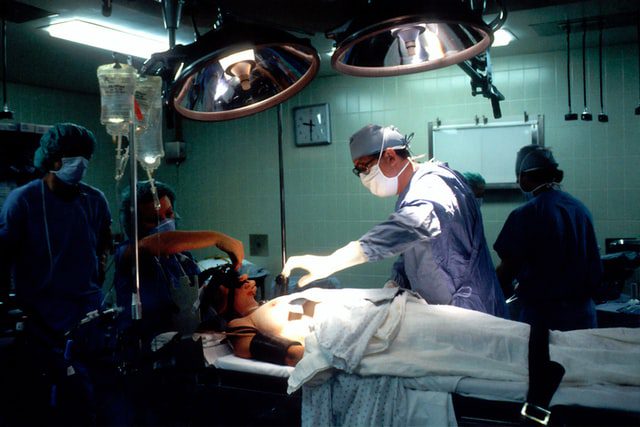
How Old Do You Have To Be To Get Top Surgery?
The answer to this question is not a straightforward one. There are many different factors that influence how realistic the answer is for your personal circumstances. The deciding factors in this question will revolve mostly around the legal capacity of a surgeon, your level of emotional and mental, but also physical maturity, and what other steps you have taken in your transition so far.
Care is taken because top surgery is a significant medical procedure and although it is not necessarily an irreversible surgery, there are elements of it that will have a lasting effect, should it so happen that for whatever reason, you wish to reverse the procedure later on.
Legal Capacity
First and foremost there is the question of legal capacity. Generally speaking, you can only undergo a medical procedure without parental consent once you reach the age of majority. For most countries, this is 18-years or older, but in Thailand, the age of majority is 20-years or older. Remember that as long as you are below the age of majority your parents are still held almost exclusively responsible for your actions and your overall wellbeing. This greatly limits the extent to which medical treatments can be administered to you without their explicit consent. A surgeon would not be able to perform any surgical procedures without the consent of at least one legal guardian.
That being said, if parental consent can be obtained then there are more factors that will play into whether you are ready for top surgery.
Physical Factors
With any surgery, there are physical factors that will play a part. Specifically, with top surgery in adolescents, there is a concern about hormone levels in cases of gender-affirming surgery. Ordinarily by the time that you reach the point of discussing surgical options you would already be taking hormone replacements and be on a strict hormone therapy regime.
How your body responds to this treatment plays a role in decisions made by surgeons.
Furthermore, your risk factors are taken into account. For example, if you smoke nicotine or marijuana products there is a greater risk of complications following surgery. Blood clots and necrosis due to limited blood flow are a major concern in top surgery candidates and will definitely affect a surgeon’s decisions related to your request for surgery.
Emotional Factors
The majority of countries will expect that you have been living as your desired gender role for at least a year prior to surgery. There will also be an expectation that you have been in regular psychological counseling and that there is well-documented gender dysphoria present in your life.
Surgeons also want to ensure that you have a support system in place and that there will be people who can help and support you, physically and emotionally, following surgery. They also want to make sure that any comorbid mental health concerns are stable and responding well to treatment.
In Other Words:
Ideally, top surgery should not be performed on individuals younger than 18-years for a variety of reasons. In Thailand, you will require parental consent and have to jump through additional hoops before you would be considered for top surgery under the age of 20-years.
However, there have been successful cases of top surgery in adolescents as young as 16-years and under certain strict circumstances, it would be possible to perform top surgery so early on. It very much will depend on your individual circumstances.
What Do We Mean By ‘Top Surgery’ In This Article?

The term ‘top surgery’ refers to gender affirmation surgical treatments performed on the chest of a transgender individual to achieve an aesthetic closer to their desired gender role. Obviously, the two types of top surgery are very different, depending on your expectations of the final result.
Trans Man/Gender Neutral Individual
In the case of someone transitioning to gender-neutral or a trans man, top surgery involves masculinizing the chest through surgery. There is usually removal of breast tissue and realignment of skin to make the chest appear more like a male chest.
Trans Woman
In the case of someone transitioning to more feminine gender identity, top surgery involves the use of breast implants and realignment of skin to mimic a feminine chest.
The Importance of Freedom of Gender Identity Expression

Gender identity expression is extremely important to transgender health. Transgender individuals who have well-documented gender dysphoria should be allowed, if not encouraged, to live according to their preferred gender role. The sooner this begins the more sufficient opportunity an individual will have to socially adjust to their preferred gender role in a world of diverse people. Ultimately this will aid in the making of an important fully informed decision regarding plastic surgery to permanently change one’s appearance.
A mental health professional will strive to encourage desired gender role expression as early as possible, long before top surgery is explored. Even in gender-nonconforming people, it is important to express their gender identity as desired before a top surgery is considered.
A surgeon will not consider performing a top surgery procedure before such a time that the individual has lived as their desired gender role for quite some time. Top surgery is a later step in the treatment of gender dysphoria.
Informed Consent
The topic of informed consent is an extremely important one in terms of health services and surgical interventions. In the case of an adolescent’s specific clinical situation, informed consent tends to go a bit deeper than it would for cases involving a younger child or an adult.
Informed consent refers to the concept of giving consent to something while completely understanding the positive and negative attributions thereof. It is the ethical underpinning of health care that prohibits medical or mental health professionals from lying to their patients for whatever reason. As the name suggests, before you can consent you need to be due diligently informed of risks and benefits alike. It is also the responsibility of the health care team to ensure that you understand these risks and benefits as well. Simply saying them out loud is not always enough.
If you are an adolescent and your parents or legal guardians still need to give consent for medical procedures then they also need to be due diligently informed of these aspects. Without informed consent, legally, you or your parents cannot have agreed to something that you did not entirely understand.
Hormone Therapy
In the vast majority of cases, patients will have been receiving hormone treatment for quite some time before discussions around top surgery begin. You will also need to continue with hormone therapy following top surgery.
If you are transitioning to a more masculine gender role you will receive testosterone treatment. Usually, this is in the form of an intramuscular injection at regular predetermined intervals. If you are transitioning to a feminine gender role then it is in the form of estrogen.
Receiving these hormones will already begin to change your body significantly. Physical changes are changes to your voice will begin to occur rather quickly and with continued treatments will continue to evolve over time.
Mental Health Concerns
Obviously, the biggest mental health concern among transgender youth is the stress and anguish caused by gender dysphoria. While gender dysphoria is the number one concern, we also need to acknowledge the impact that other mental health concerns can have. Sometimes it is necessary to address comorbid conditions before we can look into gender dysphoria. This is really only done in order to ensure the most successful and long-lasting positive outcome for mental health concerns.
If a mental health professional suggests further counseling before surgery it is to ensure the best possible long-term outcome for you. They want to make sure that you are ready to face major changes and deal with any unexpected complications associated with major surgery. They also want to ensure that you are able to become the best possible version of yourself.
Recovery Following Surgery
Specific instructions related to recovery following surgery will differ depending on whether you underwent surgery to have a more masculine appearance or a more feminine appearance.
You might be required to avoid lifting objects or even lifting your arms up. You will need physical assistance for primary care, such as preparing meals or even washing, not to mention the care of the wounds themselves. The first few weeks following surgery can be a major adjustment just based on the recovery process alone. There will also be specific instructions on how to minimize scarring.
Health Insurance

Every health insurance company will likely have some form of suggested sequence in which a transformation should occur. Should you wish to receive insurance coverage it might be a good idea to try to adhere to this as far as possible. If you are not comfortable with it please feel free to discuss it with your medical or mental health provider so that a possible alternative solution can be explored.Possible Complications

Possible Complications
As with any major surgery, there are always possible complications to be aware of. Unfortunately, these are unavoidable and usually not attributed to the skills of a surgeon, but rather a number of other factors that we try our best to control, but are sometimes out of our hands.
The removal of breast tissue will carry its own set of specific risks, where the increase of breast size for trans women will have a different set of risks. It will be good to discuss risks with your surgeon in preparation for the surgery. It is important that your legal guardians also understand these risks.
Because they are sometimes unavoidable it is best to try and prepare for them ahead of time, even if it is only mental preparation. In the end, you will need to make a fully informed decision which includes the possibility of risks and complications. Transgender health is a very important issue and at the forefront of the top surgery repertoire as top surgery is often performed before bottom surgery and thus the reaction of transgender patients to their top surgery can be an influential consideration during discussions of bottom surgery. Both are significant medical procedures.
Blood Clots
A major complication following surgery is the presence of a blood clot. This happens when clotting of the blood occurs internally and a piece of clotted blood breaks off and starts traveling around the circulatory system.
They can become stuck in smaller veins and arteries or travel through organs causing problems as they go. They tend to cut off vital blood supply to any area they get in the way off and this can lead to necrosis, heart attacks, or strokes, among other things.
They are a very serious complication to surgery and will be treated as an emergency as in severe cases a blood clot can lead to lifelong disability or death, especially in cases of deep vein thrombosis.
People who have high blood pressure, are overweight, or smoke is at a higher risk of developing this complication following surgery. A surgeon might suggest that you try quitting smoking or lose some weight before surgery just to lessen the risk of complications.
Infections
Infections are another major complication of any surgical procedure. They are caused by microbial invasion of wounds. Surgery and hospitals are usually highly sterile which lessens the risk of infections, but unfortunately, microbes are so small that they can sometimes sneak in anyway.
There are even some that have adapted to the sterile environment in hospitals are live there exclusively. Although cases of such infections are rare, there is always a small possibility that it could happen.
You could also contract an infection following discharge from the hospital while you are caring for your wounds at home. Infections are usually more prevalent where blood flow is impaired.
Effect of Young Age on Healing Process
At different points in our lives, we tend to heal at different rates. This is not entirely standardized as other factors also play a role, but generally speaking, we tend to heal faster and better when we are younger.
However, we still continue to grow, and this is significant when considering medical procedures, especially medical procedures specifically designed to alter your physical appearance. If you are still young your physical appearance will naturally still change a lot, and this has to be factored into long-term plans associated with healing following gender affirmation surgical interventions.
Long Term Optimal Aesthetic Results
In order to best achieve these goals, a surgeon will always consider how the human body is likely to change as age progresses.
Excess Skin
Especially when undergoing surgery at a younger age skin elasticity needs to be considered. Elastic skin heals quite well, but growth over time can stretch the skin or leave excess skin flaps if we are not careful. This is especially relevant with top surgery.
If masculinizing the chest there will be some skin that needs to be trimmed off, but then again not so much that the skin becomes uncomfortably or unappealingly stretched as you continue to grow.
If feminizing the chest there might not be enough skin available, the skin will then need to be stretched using special balloons. It is a gradual process and makes for the best results, but the surgeon will need to account for further changes you will undergo as you grow.

In Conclusion
This article has covered quite a bit of essential information that will ultimately influence when you could undergo top surgery. There are many decisions that need to be made along the way, and it truly is a journey that you will undertake in order to become the best possible version of yourself. Keep going strong and keep believing! You will be there before you know it.



